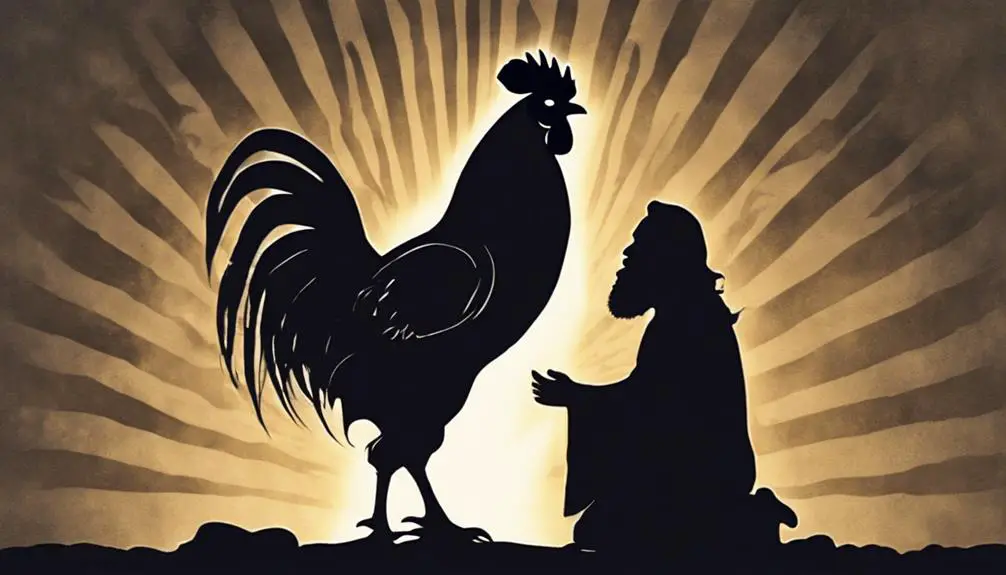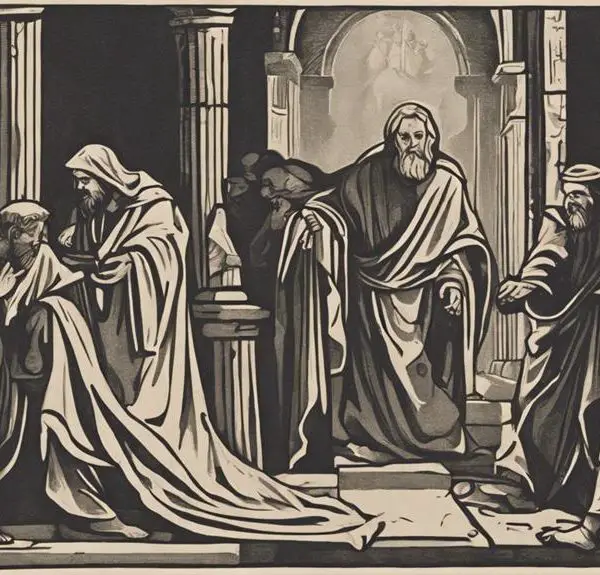Hinting at deception's deep roots, explore who reigns as the Bible's ultimate fabricator, unveiling truths that challenge and enlighten.

Biggest Liar in the Bible
Imagine walking through a dense, verdant garden, where the serpent's sly whisper sets the stage for history's first lie. You've likely heard tales of deceit throughout the Bible, from Jacob's cunning theft of Esau's blessing to Peter's thrice-denied connection to Christ.
Each story weaves a complex narrative of truth and deception, challenging us to discern the most significant fabricator of them all. As you ponder the motives and consequences of these biblical falsehoods, consider what these narratives reveal about human nature and divine justice.
The answer might surprise you, urging you to explore deeper into the shadows of these ancient texts.
Key Takeaways
- The Serpent in Eden is a central deceiver, leading humanity away from divine grace through falsehood.
- Jacob's deceit in securing his inheritance marks a significant betrayal within familial bonds.
- Ananias and Sapphira's financial dishonesty underscores the severe consequences of deceit in a community.
- Satan's role in tempting individuals highlights a pervasive influence on moral integrity and personal judgment.
The Serpent in Eden

In the narrative of Genesis, the Serpent in Eden emerges as a pivotal figure of deception, skillfully tempting Eve with falsehoods that lead to mankind's fall from grace. This incident, often cited as the original sin, underscores the serpent's cunning as it persuades Eve to consume the forbidden fruit, contravening God's explicit command. The serpent's approach is subtle yet profound, framing the act not as defiance but as an opportunity for enlightenment, suggesting that eating the fruit would make them like God, knowing good and evil.
Analyzing this episode reveals the serpent's strategic manipulation of truth and its understanding of human psychology. By appealing to Eve's curiosity and desire for wisdom, the serpent positions itself not as an adversary but as a guide toward a higher understanding, a tactic that proves disastrously effective. The consumption of the forbidden fruit, a direct result of the serpent's guile, not only represents a breach of trust between humanity and God but also sets the stage for the complexities of human moral consciousness.
The serpent's role in this narrative highlights the intricate interplay between deception, desire, and the quest for knowledge, encapsulating the profound consequences of its lies.
Jacob's Deception
While the serpent in Eden introduced deception at the dawn of humanity, Jacob's acts of deceit further complicate the biblical narrative of truth and falsehood. You'll find that Jacob's quest for his inheritance leads to pivotal moments of deceit, directly impacting his brother Esau's destiny. At the heart of Jacob's deception are two significant acts: the stealing of Esau's birthright and the subsequent blessing meant for Esau.
Analyzing these events, you observe a complex interplay of ambition, familial duty, and divine will. Jacob's strategic use of Esau's moment of weakness—trading a meal for the birthright—underscores the pragmatism that characterizes his pursuit of what he believes is rightfully his. This action alone sets the stage for Esau's loss but is further compounded by Jacob's impersonation of Esau to receive Isaac's blessing.
These deceptions not only secure Jacob's inheritance but also redefine the familial and divine trajectory of both brothers. The narrative invites you to ponder the moral ambiguities inherent in Jacob's actions and their long-term consequences on Esau's loss, challenging the simplistic dichotomy of truth versus falsehood.
Peter Denies Christ

Shifting focus to the New Testament, Peter's denial of Christ represents another complex moment of betrayal intertwined with fear and human frailty. This act of fearful betrayal unfolds as Peter, one of Jesus' closest disciples, faces the threat of association with him after his arrest. Despite his earlier vows of unwavering loyalty, Peter succumbs to his fear, denying any connection to Jesus not once, but three times.
The rooster's crow, marking his third denial, serves as a poignant symbol of Peter's failure and the fulfillment of Jesus' prediction. This moment isn't merely a narrative detail; it underscores the profound emotional turmoil and the immediate recognition of his betrayal by Peter. The rooster's crow awakens him to the gravity of his actions, leading to a deeply personal moment of repentance.
Analyzing this episode, it's clear that Peter's denial doesn't stem from malice but from a momentary lapse driven by fear. It's a narrative that exposes the vulnerabilities inherent in human nature, highlighting how fear can lead even the most faithful to betray their deepest convictions. This account, rich in symbolism and psychological depth, offers valuable insights into the complexities of fear, loyalty, and repentance.
Ananias and Sapphira's Betrayal
Ananias and Sapphira's deceit represents a stark lesson in integrity, illustrating the dire consequences of lying to the Holy Spirit within the early Christian community. This narrative, found in the Acts of the Apostles, underscores the gravity of financial dishonesty and its ramifications not only on an individual level but also within the broader community context.
By choosing to withhold part of the proceeds from the sale of their property, while pretending to donate the entire amount, Ananias and Sapphira engaged in a form of financial dishonesty that had severe community consequences. Their actions weren't merely a private failing; they struck at the heart of the communal trust and integrity that underpinned the early Christian society. The community's response, as narrated, serves as a cautionary tale, emphasizing the importance of transparency and honesty in financial dealings.
Moreover, this episode highlights the expectation of mutual support and sincerity within the community, suggesting that personal integrity was considered foundational for the health and survival of the group. The story of Ananias and Sapphira, thus, acts as a powerful allegory for the destructive potential of deceit, particularly when it undermines communal bonds and trust.
Satan's Temptations

Satan's temptations, as depicted throughout biblical narratives, serve as a multifaceted examination of human vulnerability and moral resilience. You find that temptation's impact isn't merely about succumbing to or resisting a singular moment of weakness; it's a profound exploration of the human condition, challenging your understanding of moral choices and their consequences. These narratives provide a lens through which to view the struggle between good and evil, internal and external forces vying for moral supremacy.
Aspect |
Description |
Influence on Moral Choices |
|---|---|---|
Nature of Temptation |
Often appears appealing and harmless |
Misleads judgment, obscuring the moral path |
Individual's Vulnerability |
Varies based on personal weaknesses and desires |
Determines susceptibility to temptation |
Consequences |
Immediate and long-term, affecting oneself and others |
Shapes the gravity of moral decision-making |
Role of Resilience |
Ability to resist temptation through strength and faith |
Essential for moral integrity and growth |
Analyzing these elements, you're encouraged to reflect on the intricate dance between temptation, choice, and consequence. Satan's role as the tempter highlights the critical moments that define moral character. Through understanding temptation's impact, you're better equipped to navigate the complexities of moral choices, fostering a deeper resilience against the challenges that test your spirit and integrity.
Frequently Asked Questions
How Does the Concept of Lying in the Bible Compare to the Understanding of Lies in Other Major World Religions?
You're exploring how the Bible's view of lying compares to other major religions, focusing on lie origins and cultural perceptions.
In your analysis, consider that while the Bible condemns lies, emphasizing their moral implications, other traditions might interpret lying differently, based on cultural contexts.
This comparison sheds light on the nuanced understanding of truth and deceit across religions, revealing that perceptions of lying are deeply influenced by societal values and historical backgrounds.
Are There Psychological or Sociological Theories That Explain Why These Biblical Characters Might Have Chosen to Lie?
You're delving into why people lie, a question that spans both psychology and sociology. Lying motivations are complex, woven from personal gain, fear of consequences, or desire for approval.
Cultural influences also play a role, shaping our views on honesty and deceit. Scholars analyze these factors to understand the intricate dance between individual choices and societal norms.
This analysis helps unpack the reasons behind lying, without singling out biblical characters or historical figures.
What Are the Long-Term Impacts of These Lies on the Communities and Societies Depicted in the Bible?
You're exploring the long-term impacts of deceit on ancient communities and societies. These lies, often entwined with divine consequences, significantly influenced societal norms and collective behavior.
They served as cautionary tales, embedding deep moral lessons into the cultural fabric. This analysis uncovers how such narratives shaped ethical standards, governance, and interpersonal relationships, highlighting the profound role of storytelling in guiding historical societies through the complexities of morality and social cohesion.
How Have Different Christian Denominations Interpreted the Moral Lessons Behind These Lies Throughout History?
You'd think interpreting moral lessons is a straight shot, but when you dive into denominational nuances and historical interpretations, it's more like herding cats. Different Christian denominations have spun a rich tapestry of meanings from these narratives, each adding their own flavor.
Analyzing these interpretations offers a scholarly feast, revealing how communities have wrestled with, and been shaped by, these teachings across centuries. It's a complex dance of theology and human nature.
Can the Act of Lying Be Ever Justified According to Other Biblical Texts or Teachings Not Covered in the Mentioned Sections?
You're exploring whether lying can ever be justified by other biblical teachings. This delves into moral ambiguity and ethical paradoxes inherent in scriptures.
Analyzing these texts reveals that, while generally condemning falsehood, the Bible presents scenarios where truth and deceit intertwine, challenging readers to discern deeper moral truths.
This objective analysis uncovers that ethical nuance is key, suggesting that absolutes in moral judgment may not always apply within a biblical context.
Conclusion
In the tapestry of biblical narratives, the thread of deceit weaves a complex pattern, illustrating humanity's and the supernatural's propensity for falsehood. From the serpent's whisper in Eden to Peter's thrice denial, each lie serves as a dark mirror, reflecting the multifaceted nature of dishonesty.
Analyzing these stories, you're confronted with the intricate dance between truth and deception, a reminder that the seeds of falsehood often bear the fruit of profound moral and spiritual lessons.



Sign up